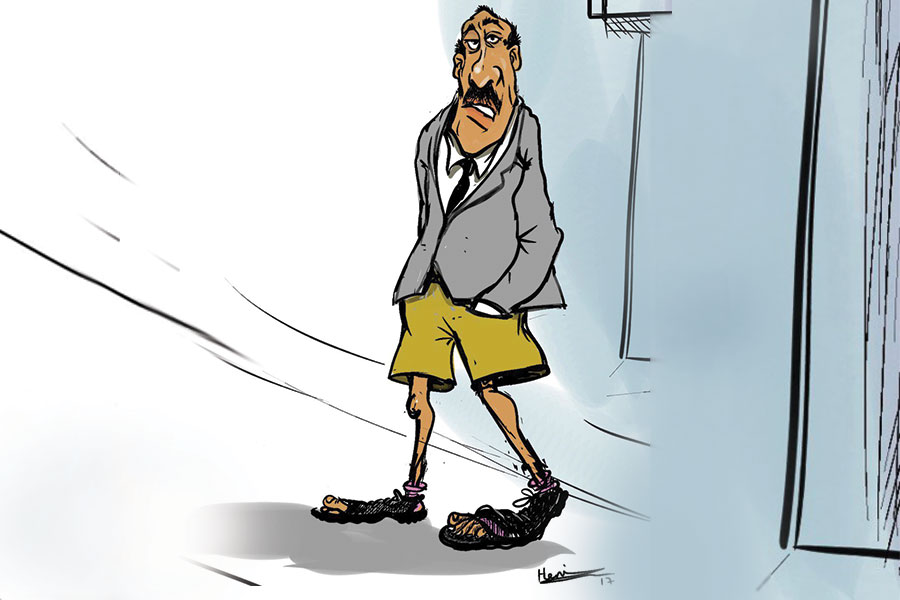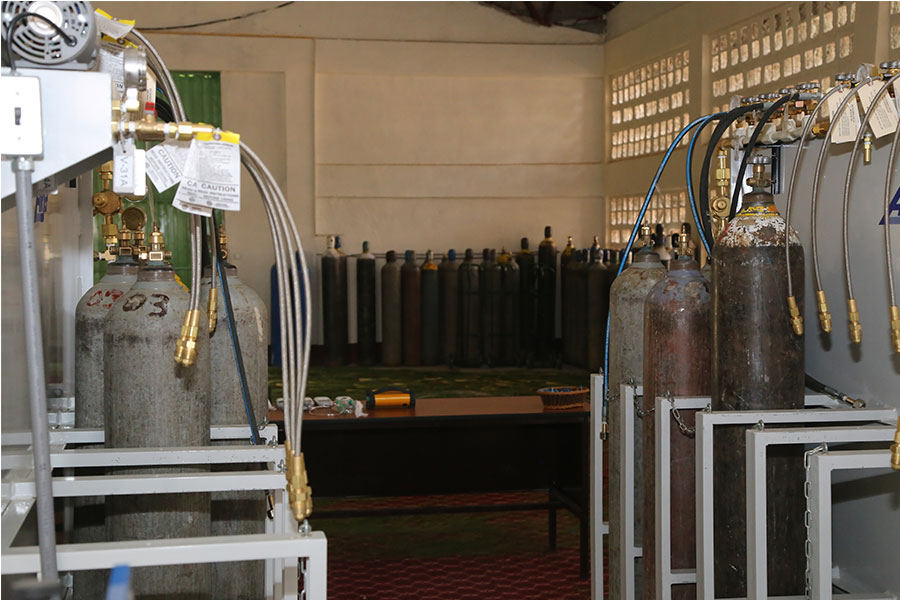
Fortune News | Oct 17,2020
Apr 25 , 2020.
There is a sense of irony to how the decision by the administration of Prime Minister Abiy Ahmed (PhD) to invoke state of emergency powers has come to be viewed across Ethiopia's political landscape.
Just a month ago, there was outrage at the blocking of telephone and internet services in the four zones of the Oromia Regional State. The restrictions in these zones were at first outright denied by government but were later admitted to and described as necessary to respond to security threats in the area.
Following the first confirmed case of the Novel Coronavirus (COVID-19) in Ethiopia, the continuation of these restrictions inspired outrage. It was feared that these restrictions would keep citizens from accessing crucial information relevant to the disease. When the administration decided to lift the restrictions, saying that the security threats have been addressed, it was hailed as a small, considerate step in the fight against the outbreak.
Only about a week later, the government declared a state of emergency, which was subsequently ratified by the Parliament almost unanimously. Ironically, this gives the government power to revoke almost any democratic or political rights held by citizens if it is deemed necessary. Including, of course, the right to access information.
It was not without subtle and overt encouragement that Prime Minister Abiy's administration travelled down the path toward declaring a state of emergency. The pandemic has been wreaking havoc on health systems and infrastructure across the world. Horrific scenes from other countries - of patients plugged into respirators and ventilators barely being able to breathe and workers digging mass graves - have been burned deep into the national psyche.
The public health threat the pandemic poses brought into greater focus the importance of the state. It made it painfully evident that only it has the organisational capability and power to respond to an emergency of this nature. No doubt, communities, individuals, private players and religious institutions have a part to play. But few, if any, came forward to deny that the state is the most critical entity in the fight against an emergency of this nature. In times of fear, the state becomes the embodiment of the interdependence of communities not the guarantor of individual independence.
Once Abiy's administration realised that it had the justification, encouraged by recommendations from a group of lawyers convened by Chief Justice Meaza Ashenafi, the administration did not waste time putting into place restrictions aimed at enforcing physical distancing measures and personal hygiene. Before long, the administration had invoked its national emergency powers.
It had the right and the implicit blessing to do so from the political and intellectual elite. With the UNECA claiming that COVID-19 could take 300,000 lives in Africa, and the unfortunate experiences of tens of thousands in European countries, there was not much ground to argue that this is not a pandemic requiring the strictest of interventions. The Constitution also identifies epidemics as legitimate grounds for the government to invoke its national emergency powers.
Included in the list of restrictions of the national emergency was the ban imposed on almost all types of assemblies, including on social events. Handshaking is now banned, and wearing masks in public settings is mandatory. Privately-owned vehicles can only be used on certain days, a measure that has left many frustrated.
These restrictions though are not as severe as what many other countries have decided to enforce. Because of the need to balance public health emergency measures with the economic considerations of those living hand-to-mouth, Ethiopia's response is relatively lax. There are no curfews and most non-essential businesses, except for bars and nightclubs, have been allowed to continue to give services and produce goods if they choose to.
The state of emergency, nonetheless, entitles the administration to a broad range of powers. It gives it the right to curtail almost every democratic and political exercise, including the right to sanction free expressions as well as hold citizens without charge or trial.
In broadening and concentrating power in the hands of the executive, a state of emergency gives the administration the ideal opportunity and justification to be far less accommodating of calls for accountability and transparency. All it has to say now is that there is a greater priority, which in this case is the safety of the public's health.
Implemented with the expressed interest of fighting a pandemic, a state of emergency also reinforces and justifies the militarisation of the police and the broadening of policing and detention powers. In effect, it makes power more absolute, and thus easier to abuse.
Indeed, putting in place a state of emergency was an inevitable choice for a nation facing the spread of a deadly virus. It is a choiceless choice. More importantly, the administration has not grabbed power it was not entitled to constitutionally. In so far as the state is tasked with the wellbeing of its citizens, a nationwide emergency was justified to fight an epidemic of such deadly magnitude.
Abiy’s administration needs to be supported in this fight against the pandemic. There should be little confusion here. Its efforts to save lives should be aided and encouraged.
Yet the sweeping powers it has just been handed should also be closely scrutinised. If there is a lesson to be taken from one of the earliest republics, Rome, or nation-states of the 20th century that flirted with democracy, power is consistently consolidated in the name of the political and economic common good and the security of the people.
Hungary is only a recent example. Following the global outbreak of the virus, its parliament voted to suspend itself and allow Prime Minister Viktor Orban to rule by decree - indefinitely! With governments treating themselves to such sweeping powers, it would not be too much of an exaggeration to assume that Hungary will not be the only country coming out on the other end of the COVID-19 pandemic with an authoritarian government.
The need for activism, calling for government transparency and accountability has never been this important. Civil societies and leaders of the opposition can step up their game in their scrutiny of the actions of the administration. Their failure will no doubt be consequential for their leaders and the rank and file.
The most important job here, however, lies with the parliament, whose oversight of the executive needs to improve. It needs to make sure that all the measures adopted by the Council of Ministers are necessary and proportional, and that they are speedily lifted once the emergency is over.
Parliament also needs to acknowledge that freedom of expression and the right to information are critical even in times of crisis. The Council of Ministers' action against the dissemination of misinformation should be interpreted very narrowly, and the Inquiry Board established as part of the ratification of the state of emergency should advise along these lines as well.
If there is one thing that the COVID-19 pandemic has made apparent, it is that the importance of the coercive powers of the state to maintain the collective safety of citizens remains a primary priority. But these current circumstances, as dire as they may be, should not be allowed to inspire the worst instincts of the government.
PUBLISHED ON
Apr 25,2020 [ VOL
21 , NO
1043]

Fortune News | Oct 17,2020

Radar | May 07,2022

Editorial | May 02,2024

Fortune News | Mar 23,2022

Viewpoints | Feb 27,2021

Editorial | Aug 09,2025

Fortune News | Apr 06,2019

Fortune News | Oct 17,2020

Fortune News | Feb 16,2019

Editorial | Mar 20,2021

Photo Gallery | 170470 Views | May 06,2019

Photo Gallery | 160707 Views | Apr 26,2019

Photo Gallery | 150348 Views | Oct 06,2021

My Opinion | 136248 Views | Aug 14,2021

Dec 22 , 2024 . By TIZITA SHEWAFERAW
Charged with transforming colossal state-owned enterprises into modern and competitiv...

Aug 18 , 2024 . By AKSAH ITALO
Although predictable Yonas Zerihun's job in the ride-hailing service is not immune to...

Jul 28 , 2024 . By TIZITA SHEWAFERAW
Unhabitual, perhaps too many, Samuel Gebreyohannes, 38, used to occasionally enjoy a couple of beers at breakfast. However, he recently swit...

Jul 13 , 2024 . By AKSAH ITALO
Investors who rely on tractors, trucks, and field vehicles for commuting, transporting commodities, and f...

Oct 5 , 2025 . By NAHOM AYELE
In Meqelle, a name long associated with industrial grit and regional pride is undergo...

Oct 5 , 2025 . By BEZAWIT HULUAGER
The federal government is set to roll out a new "motor vehicle circulation tax" in th...

Oct 5 , 2025 . By NAHOM AYELE
The Bank of Abyssinia is wrestling with the loss of a prime plot of land once leased...

Oct 5 , 2025 . By BEZAWIT HULUAGER
The Customs Commission has introduced new tariffs on a wide range of imported goods i...